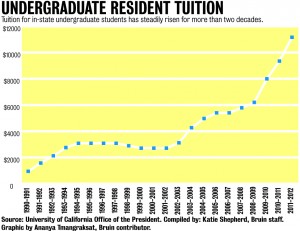A multi-year tuition freeze is a great deal for students who will be enrolled while tuition remains stable, but students entering the University of California after levels thaw could be left to deal with sizeable consequences.
If Gov. Jerry Brown’s current budget proposal is approved in June, Californians will be promised four more years of relative stability in student fees. The May revision, the newest version of the state budget, maintained Brown’s earlier promise of a sustained four-year tuition freeze.
If Brown’s proposal holds, in four years, after the period of artificial stability created by a state-imposed tuition freeze, students accustomed to steady tuition costs might encounter massive increases that would have a much more dramatic impact on college affordability than slow, incremental growth.
This February, the Legislative Analyst’s Office expressed concerns over the governor’s plan to freeze tuition in a budget analysis. The organization’s report pointed to the tendency for steep tuition increases to follow freezes as a key problem in the proposal.
The regents should be cautious in approving a tuition freeze because a rebound effect might cause excess hardship for future students. If slow, moderate increases will make college affordable for more students in the long run, then the UC should embrace that route.
A tuition freeze entails an understanding between the state and the university that funding will remain stable enough to stop tuition increases for a set number of years. In return, the state expects the university to meet certain benchmarks like enrollment targets and graduation rates. But changes to the state budget could jeopardize the tuition freeze.
Daniel Mitchell, a professor emeritus of the UCLA Anderson School of Management and UCLA Luskin School of Public Affairs, told the Daily Bruin last week that even the finalized budget is not an enforceable contract and is subject to change.
Student fees depend heavily on the yearly budget that goes through months of negotiations and revisions before the California legislature finally approves it each year. Given the track record of state funding for the UC over the past two decades, students and administrators should be cautious in expecting Brown’s long-term proposals to last.
In the past, governors have attempted to keep tuition steady, but they can’t control the ups and downs of the economy.
Former Gov. Arnold Schwarzenegger’s 2004 agreement with the UC is a prime example of a compact that resulted in unexpected and severe cuts to the UC budget. Schwarzenegger broke his agreement with the UC and slashed funding for education in 2008 and 2009 when money available for the California budget fell billions of dollars below what the state expected.
Even if the freeze can last for the full four years, its effects could cause problems for UC students down the road. Students who enter the UC after the freeze will likely encounter a far less affordable university system than they would find today. Continuing students at the UC who have budgeted for tuition levels like those during the freeze could suddenly face a great increase in cost.
The potential tuition spike could have a particularly negative effect on low-income students to whom the expected cost of education is extremely important.
“For low-income and first generation students the sticker price is very important,” said Ray Franke, an assistant professor at the University of Massachusetts Boston, who collaborated with UCLA’s Higher Education Research Institute. “There is a higher chance these students will attend if the predicted price is low.”
Still, freezes offer short-term advantages to students. A tuition freeze offers major benefits by providing predictability that facilitates easy budgeting throughout the duration of a student’s academic career, if that career falls within the four years of the freeze.
Despite the appeal of a tuition freeze that offers help to current students, maintaining future affordability and access to the UC should be a priority.
Email Shepherd at kshepherd@media.ucla.edu. Send general comments to opinion@media.ucla.edu or tweet us @DBOpinion.


So you’re actually advocating that they raise fees more on us? It’s not enough that they’ve tripled since 2002 and doubled since 2008? Not only are you a horrible thinker, but you’re also a horrible person.
OH MY GOSH THEY MIGHT INCREASE FEES ON US AFTER THEY’RE DONE NOT INCREASING FEES ON US. THEREFORE, WE SHOULD JUST FORCE THEM TO CONSTANTLY INCREASE FEES ON US EVEN MORE, SO THAT WE CAN BE “REALISTIC”, RIGHT???
I mean, this doesn’t even make any logical sense, much less moral sense. It’s not even a question of whether we should suffer or students in the future should suffer; the author’s trying to claim that because students down the line might suffer, we should make ourselves suffer pointlessly more. If we raise fees now, they won’t be any lower for those future students, so their budgeting won’t be affected; if anything, they’ll be even higher, because the state will use that as an excuse to cut our funding more, and fee hikes will have a higher momentum. So even the ridiculous “logic” of this immoral argument is self-defeating.
The Daily Bruin has put out some terribly argued terrible opinions in the past, but this has to take the cake (except, possibly, for the editorial that argued in favor of sweatshops). There is absolutely no upside to this. The authors themselves will suffer under their own propositions. California on the whole will suffer from an increasingly expensive and therefore inaccessible and unequal educational system. How did this get written, approved, and printed? How did this person get into this school? Why is she here instead of in some masochistic dungeon? This just doesn’t even make a horrible kind of sense; it seriously reads like Swift’s “Modest Proposal.”